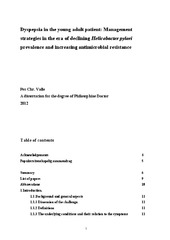| dc.contributor.advisor | Paulssen, Eyvind | |
| dc.contributor.author | Valle, Per Christian | |
| dc.date.accessioned | 2013-11-11T11:57:35Z | |
| dc.date.available | 2013-11-11T11:57:35Z | |
| dc.date.issued | 2013-06-21 | |
| dc.description.abstract | Helicobacter pylori (H. pylori) is the main cause of peptic ulcer disease (PUD), followed by regular consumption of non-steroidal anti-inflammatory drugs (NSAIDs). The occurrence of gastric cancer is very low below the age of 45-50 years and thus does not justify any kind of symptom-based endoscopic screening. H. pylori also plays a well-documented, but minor role in functional dyspepsia (FD).
In the predominant international guidelines for managing young dyspeptic patients, initial testing for H. pylori and treatment directly if positive without further examination are recommended. This strategy is supposed to save many upper gastro-intestinal (GI) endoscopies, while the patients who have peptic ulcer disease (PUD) will receive the adequate treatment to terminate the disease.
However, this strategy leads to many prescriptions of broad-spectrum antibiotics without contribution to improvement for most of the patients receiving them.
This strategy has not been officially adopted in Norway where a wider access to endoscopy has been practiced. This leads to a significant number of negative endoscopies in a group of patients where serious pathology is infrequent.
The studied strategy concerning selection of young dyspeptic patients to upper-GI endoscopy we showed a reduction of useful examinations by more than 50%, without overlooking significant pathology. At the same time, the use of antibiotics could be restricted to situations where it has an indisputable role, such as peptic ulcer disease (PUD (Paper I).
After one-year follow-up we found that patients with PUD had the highest score of symptom improvement. These patients recorded H. pylori eradication therapy as main reason for improvement. In the patients with functional dyspepsia who experienced improvement of symptoms, change of life situation and diets were recorded as main reason for improvement. Only 16% in this group recorded the endoscopy and the subsequent information received as being of importance (Paper II).
In Paper III we have analysed how different non-invasive tests for H. pylori with different test properties would have influenced on the outcome of the study.
The dissertation discusses further the implications of the studied selection strategy in the contexts of functional dyspepsia, gastric cancer prevention and the consequences for microbiological resistance. | en |
| dc.description.doctoraltype | ph.d. | en |
| dc.description.popularabstract | Pasienter med dyspepesi utgjør en stor del av konsultasjonene i almenpraksis og på sykehusenes endoskopiske laboratorier. I denne studien testet vi en strategi for å selektere ut dyspeptiske pasientene under 45 år hvor gastroskopi vil være nyttig og følgelig i hvilke situasjoner unødvendige skopier følgelig kan unngås uten at alvorlig sykdom overses.
Ved hjelp av noen enkle forundersøkelser hos fastlegen viser vi at vi hos pasienter under 45 år med dyspepsi på en trygg måte kan redusere antall skopier med mer enn 50%. Testene går ut på å avsløre om pasienten har risikofaktorer for magesår bla ved å teste for magesårsbakterien Helicobacter pylori. Strategien medfører også en strammere indikasjon for behandling av den samme bakterien enn det som praktiseres i vestlige del av verden for øvrig og kan dermed bidra til hindre dårlig underbygget bruk av bredspektrede antibiotika til en stor gruppe pasienter. Dette er viktig for å hindre økning av multiresistente bakterier. | en |
| dc.description | The papers of this thesis are not available in Munin: <br/>1. Per C. Valle, Ragnar K. Breckan, Anil Amin, Magnhild Gangsøy Kristiansen, Einar Husebye, Kåre Nordgård, Liisa Mortensen, Odd A. Kildahl-Andersen and Anna M. Wessel-Berg: '“Test, score and scope”: A selection strategy for safe reduction of upper gastrointestinal endoscopies in young dyspeptic patients referred from primary care', Scandinavian Journal of Gastroenterology (2006), vol.41(2):161-169, available at <a href=http://dx.doi.org/10.1080/00365520500286881>http://dx.doi.org/10.1080/00365520500286881</a> <br/>2. Per C. Valle, Ragnar K. Breckan and Odd Kildahl-Andersen: 'Do Young Dyspeptic Patients Consider Upper Gastro-intestinal Endoscopy Useful?' Hepato-Gastroenterology (2010), vol. 57(102-103):1164-1169, available at <a href=http://www.hepatogastroenterology.org/index.php/issue-102-103-september-october-2010/item/1428-do-young-dyspeptic-patients-consider-upper-gastro-intestinal-endoscopy-useful?>http://www.hepatogastroenterology.org/index.php/issue-102-103-september-october-2010/item/1428-do-young-dyspeptic-patients-consider-upper-gastro-intestinal-endoscopy-useful?</a> <br/>3. Per C. Valle, Ragnar K. Breckan, Liisa Mortensen, Anil Amin, Odd
Kildahl-Andersen and Eyvind J. Paulssen: 'Managing dyspepsia in the young adult patient: effects of different tests for Helicobacter pylori in a “test-and-scope” approach"' (manuscript) | en |
| dc.identifier.uri | https://hdl.handle.net/10037/5490 | |
| dc.identifier.urn | URN:NBN:no-uit_munin_5189 | |
| dc.language.iso | eng | en |
| dc.rights.accessRights | openAccess | |
| dc.rights.holder | Copyright 2013 The Author(s) | |
| dc.rights.uri | https://creativecommons.org/licenses/by-nc-sa/3.0 | en_US |
| dc.rights | Attribution-NonCommercial-ShareAlike 3.0 Unported (CC BY-NC-SA 3.0) | en_US |
| dc.subject | VDP::Medisinske Fag: 700::Klinisk medisinske fag: 750::Gasteroenterologi: 773 | en |
| dc.subject | VDP::Medical disciplines: 700::Clinical medical disciplines: 750::Gastroenterology: 773 | en |
| dc.title | Dyspepsia in the young adult patient: Management strategies in the era of declining Helicobacter pylori prevalence and increasing antimicrobial resistance | en |
| dc.type | Doctoral thesis | en |
| dc.type | Doktorgradsavhandling | en |


 English
English norsk
norsk
